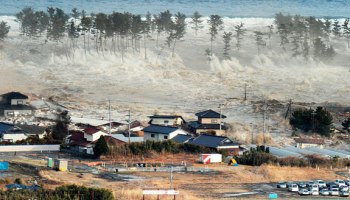ITU Deploys Emergency Telecoms To Japan

The UN agency for ICT is providing emergency telecoms for victims of the Japan earthquake
The International Telecommunications Union is deploying emergency telecoms in Japan, to help people in areas severely affected by the recent earthquake and tsunami.
The ITU, which is the United Nations agency for information and communication technology issues, has dispatched satellite phones made by Thuraya and Iridium – some of which are also equipped with GPS to facilitate search and rescue efforts – as well as Broadband Global Area Network (BGAN) terminals from Inmarsat.
The equipment can be charged using car batteries and is also supplied with solar panels to enable operations during power outages.
Re-establishing vital communications
“ITU is prepared to help the government and people of Japan in every way possible in their hour of need and to deal with the colossal tragedy that has overwhelmed the country with unimaginable loss of life and property,” said ITU secretary-general Hamadoun Touré (pictured).
 “I hope the deployment of emergency telecommunications equipment will assist the Government of Japan in search and rescue operations and re-establish vital communication links.”
“I hope the deployment of emergency telecommunications equipment will assist the Government of Japan in search and rescue operations and re-establish vital communication links.”
The ITU says that re-establishing communications is crucial in the immediate aftermath of disasters, because they can ensure timely intervention and support for the victims and assist in rescue and rehabilitation efforts.
Last year the ITU deployed 100 satellite terminals to parts of Pakistan that were ravaged by severe flooding in August. The terminals were used to restore communications and provide telemedicine applications and services in remote areas of the country.
Victims of the Haiti earthquake in January 2010 also benefited from emergency telecoms. Satellite provider Inmarsat was awarded the UK’s most prestigious prize for engineering innovation for the role its BGAN technology played in helping to provide connectivity for aid agencies and victims at that time.
For example, on the 20 January 2010, a few days after the Haiti earthquake struck, 137 BGAN terminals were sending and receiving data while also supporting 35 telephone conversations. In just that one day, the system allowed around 36,054 minutes of communication to take place.
Longer-term effects in Japan
The devastating earthquake that hit Japan on Friday reportedly measured 9.0 on the Richter scale, and swept clean a vast portion of the north-eastern part of Japan’s main island. Despite the loss of nearly half of its undersea cables, and despite the lack of power in the regions most seriously affected, the country’s internet infrastructure has remarkably remained intact.
However, it has been suggested that the disaster could have significant short-term effects on the semiconductor industry. Japan and Taiwan make up a huge amount of the global semiconductor manufacturing, and even the smallest amount of downtime could have a large impact on chip supply and prices, analysts warned.
Meanwhile, cyber criminals have been quick to move in and poison search results based on the disaster with malicious links to fake anti-virus software. Last week Trend Micro researchers warned that malware writers are using black-hat search engine manipulation techniques to push these links to the top of the search results.